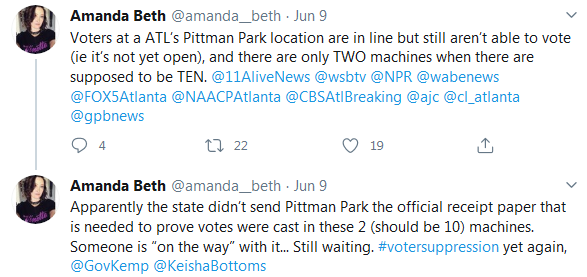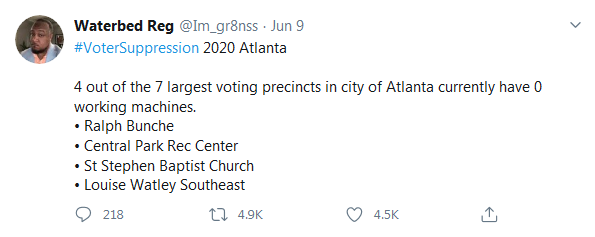The Daily Escape:

Mt. Fuji from the shore of Lake Motosu, Japan – 2020 photo by wash7112
“The long-standing wrangle over voting rights and election security came to a head in Georgia, where a messy primary and partisan finger-pointing offered an unsettling preview of a November contest when battleground states could face potentially record turnout.
There were hours-long lines, voting machine malfunctions, provisional ballot shortages and absentee ballots failing to arrive in time for Tuesday’s elections. Many of the problems were in predominantly black neighborhoods in and around Atlanta.
Both Republicans and Democrats finger-pointed at the other. The AP says: (emphasis by Wrongo)
“That kind of back-and-forth, with white Republicans and black Democrats from big cities trading barbs over voting issues, isn’t new. And it’s one that could easily repeat in November in battleground states where Democrats and minorities figure prominently in the most populous cities and counties: Broward County (Fort Lauderdale), Florida; Wayne County (Detroit), Michigan; Charlotte, North Carolina; Philadelphia PA; and Milwaukee WI.”
This raises the specter of a worst-case November scenario: a swing state, like Florida remaining in dispute long after polls close. Meanwhile, Trump, Biden and their supporters each offer competing claims of victory or questions about the election’s legitimacy.
These legitimacy questions arise because there’s a real possibility of election theft. Here’s a few for your consideration: Florida 2000, Ohio 2004, Democratic primaries in 2016 and 2020. Georgia’s governor’s race in 2018. It’s always the same tactics. Here are three:
- Game the voting locations
- Game the voting machines
- Game the ballots
Voting locations: Changing voting locations is often combined with reducing the number of voting locations. Both happened in Georgia. From the Atlanta Journal-Constitution:
“County election officials have closed 214 precincts across the state since 2012, according to an analysis by The Atlanta Journal-Constitution. That figure means nearly 8% of the state’s polling places…have shut their doors over the past six years.
One-third of Georgia’s counties — 53 of 159 — have fewer precincts today than they did in 2012, according to the AJC’s count.
Of the counties that have closed voting locations, 39 have poverty rates that are higher than the state average. Thirty have significant African-American populations…”
Voting Machines: The NYT reports that Georgia’s voting fiasco stemmed primarily from the 30,000 new voting machines the state bought last year for $107 million from Denver, CO’s Dominion Voting Systems.
The problems ran the gamut from too few machines, to no printer paper for the machines:

And non-working machines:

Many were against buying these voting machines, including FreedomWorks, the conservative nonprofit backed by Charles Koch, who cited several concerns, including that the machines were difficult to set up before elections.
And so they were.
The ballots: Absentee and Vote-by-Mail Ballots may not arrive on time, if at all. Provisional ballots may not be available in sufficient numbers at polling places. In Georgia, for example:
“The individuals had requested absentee ballots, but they didn’t arrive in time to send in, but when they showed up to try and vote in person, they were blocked because the system had indicated they already had an absentee ballot, which, again, they said they never received…”
That wasn’t all. Poll workers couldn’t get voting machines to work. They didn’t know how to encode voter access cards, enter PIN numbers correctly or even plug machines into power supplies. Poll workers said they couldn’t log into voter check-in tablets, and ballots didn’t always display on touchscreens.
Some precincts opened late. Very few stayed open late. Some voters gave up and went home.
People who work at polling places skew older, and are unfamiliar with technology. They must be trained and equipped to do the job, and it seems that fewer than expected showed up. These volunteers did not sign up to train voters how to use touchscreens, or to disinfect touchscreens, or to deal with irate crowds who have been waiting for hours.
The problem is not the volunteers, but the voting machines themselves, which introduce complexity without adding security.
We’re facing a crisis of election legitimacy.
Despite federalism, it is imperative that America comes up with a standard voting system. And in this age of technology it is ridiculous to have to still vote in person. But of course the Republicans oppose other methods of voting such as vote by mail.
This current chaos, along with voter disenfranchisement is in the best interests of the GOP, and it is by design.
They will dither and fuss and spew platitudes laced with false concern, while trying to rob us of democracy.

We tell ourselves (or some people tell us) that the states are a laboratory of Democracy but they are mostly not. A few states do move us forward but much of what states do is experiment in preventing Democracy. There is even an ideological defense of bad behavior. Thus, when someone cries out about Democracy, a talking head reminds us that no, we are a Republic. But who is in charge? If not a Democratic Republic, a what? The answer is an oligarchy. It is all very sad.